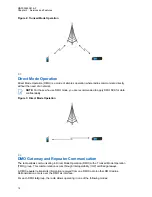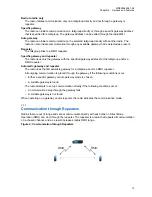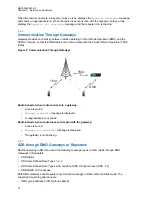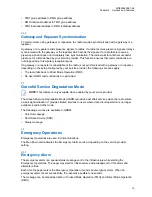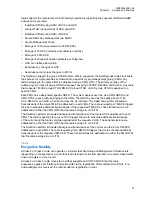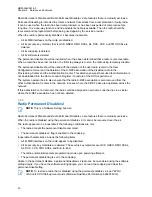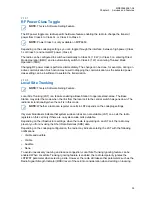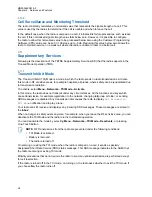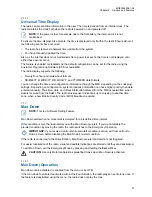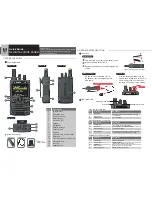
signaling and group communication traffic encryption using CCKs as well as encryption of uplink and
down link individually addressed signaling messages and individual call traffic (private or phone) using
its DCKs. The radios support Over the Air Re-keying (OTAR) of the CCK by the system.
A clear radio can transmit and receive from encrypted radios. The system informs the encrypted radios
that the communication is with a clear radio and they switch to clear operation. Class 2 and 3 radios
can only act as described if they are allowed to operate in a lower class.
2.8.4.4
Group Cipher Keys Encryption (Class 3G)
For the Security Class 3G the system allows grouping addressed signaling and dedicated group call
traffic encryption using Group Cipher Keys (GCK) to cryptographically isolate talkgroups.
The downlink signaling is encrypted using Modified Group Cipher Key (MGCK) that is cryptographically
derived from the Common Cipher Key (CCK) associated with the serving cell and the GCK associated
with a given talkgroup. The Switching and Management Infrastructure (SwMI) does not change GCK
and CCK simultaneously. Whenever a GCK change occurs, CCK changes are frozen for this time
period.
The Derived Cipher Key (DCK) is derived from either the one way or mutual authentication process
and the CCK is received during registry, whereas the GCK is received through Over-the-Air Rekeying
(OTAR) mechanism only.
The radio supports over-the-air and manual provisioning of key associations that link a GCK to one or
more Trunked Mode Operation (TMO) talkgroups, and manual provisionings of Key Association Group
(KAG) to one or more Direct Mode Operation (DMO) talkgroups.
The system can provide the ability for the operator to group contiguous ranges of TMO Short
Subscriber Identity (SSI). This case occurs where any talkgroup residing within the address range
is assigned using the same GCK association. These ranges, referred to as Key Association Ranges
(KAR), are used to convey the TMO talkgroup and GCK relationships to the relevant SwMI and radios
responsible for GCK functions.
2.8.4.5
Over-the-Air-Rekeying
TETRA systems support GCK encryption for specific talkgroups:
• Group Over-the-Air-Rekeying (OTAR) of GCK.
• Group OTAR of fallback TM-SCK.
• Group OTAR of DM-SCK, including management of the cryptographic schedule of DM-SCKs.
The group OTAR mechanisms require a use of the group session key for OTAR (GSKO). The GSKO is
delivered to the radio only by using individual OTAR and the session key for OTAR (KSO).
For the systems utilizing group OTAR, the fundamental system operation (regarding SCK/GCK OTAR)
relies on the sites regular transmission. In other words, the sites are regularly broadcasting information
regarding which security class and associated keys are in use. The sites transmit future versions of the
respective keys to groups of radios belonging to the same cryptographic management group (CMG).
The radios acquire the keys before the SwMI activates them. Then the air interface encryption service
uses the keys. The sites also broadcast the current key that is in use which can be sent using OTAR
mechanism to the radio on request.
NOTE:
When a radio has not received a new key before activation by the SwMI, the radio
requests the missing keys.
Some systems adopt only individual OTAR methods for delivery of SCK and GCK to the radio. In such
cases GSKO is not used. Some systems employ a mix of individual and group OTAR methods. The
MN003465A01-AF
Chapter 2 : Services and Features
26

